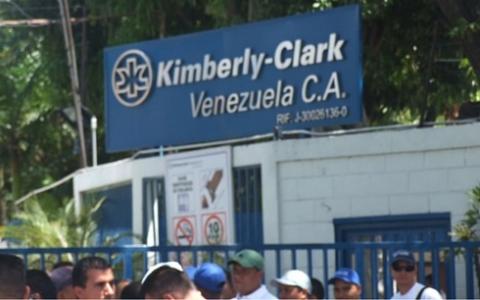The Kimberly Clark Corporation is a producer of numerous personal, feminine, and baby care brands including Huggies, Kotex. These products have been in short-supply throughout the country, causing grief for many Venezuelans.
President Nicolas Maduro has repeatedly accused managers and owners of certain private companies of engaging in an “economic war” against his government by deliberately limiting the availability of basic goods, including personal hygiene products.
The factory halted operations earlier this month and fired more than 900 workers, with the company alleging that they lacked the raw materials to make their products.
In response, the Venezuelan government seized the factory and handed it over to the workers, at their request.
“Kimberly-Clark will continue producing for all Venezuelans and is now in the hands of the workers,” said Labor Minister Oswaldo Vera.
President Maduro had warned in May that shuttered businesses and factories would be given to the workers so production could be restarted.
Minister Miguel Perez Abad added that the factory had enough raw materials to last until the end of the calendar year.
The Venezuelan government also recently launched a new program aimed at tackling shortages of food and medical supplies in the South American country.
Titled the Great Sovereign and Safe Supply Mission, the project will focus on the food, pharmaceutical, and industrial sectors in Venezuela, under the oversight of the president and Defense Minister Vladimir Padrino.
The program will aim to develop more efficient local production as well as a new system to effectively distribute basic products to tackle some of the root problems of the crisis, which the government has repeatedly linked to the largely private control over supply chain from production to distribution.
Venezuela Backs Worker Takeover of Kimberley Clark as Citibank Moves to Close BCV Account
Lucas Koerner, venezuelanalysis.com
Philadelphia, July 12, 2016 (venezuelanalysis.com) – Venezuela’s Labor Ministry approved Monday a workers’ request to occupy a plant owned by the US consumer products giant Kimberly-Clark after the latter closed its doors in the South American country.
The order came directly from Venezuelan President Nicolas Maduro who condemned the transnational firm for its decision Saturday to shut down a diaper and toilet paper factory in Maracay, firing 971 workers.
“Forty-eight hours ago, without notice, a US company called Kimberly-Clark, violating national laws and the constitution, fired almost 1,000 workers from its production plant, closed the door and left the country,” declared Maduro, speaking on state television.
Under Venezuela’s 2012 Labor Law, mass firings are strictly prohibited and firms that shut their doors illegally are liable to be reopened under workers' control.
“Kimberly is now in the hands of the workers - producing, working, and we are going to invest the necessary resources in order to consolidate [the plant],” Maduro added.
According to Venezuela’s Labor Ministry, the plant has a monthly output of 33 million diapers, 20 million sanitary pads, 27 million thin liners, and 17 million rolls of toilet paper - all of which was brought to a standstill due to the closure.
Following the workers' takeover, the factory is now operating at ful capacity, confirmed a Labor Ministry inspection Tuesday.
In a press statement, the Texas-based conglomerate defended its decision to leave, complaining of alleged difficulties accessing raw materials as well as US dollars for imports.
In recent months, a slew of multinational firms– including Bridgestone, General Mills, and Procter & Gable– have likewise scaled back operations in the country citing similar problems associated with Venezuela’s economic downturn.
The Maduro government, for its part, has accused these companies of economic “sabotage”, pointing to the vast quantities of US dollars these firms have received from the Venezuelan state in exchange for production or imports.
As part of this “economic war” waged by transnational firms and foreign states against his government, Maduro also took at aim at what he termed a “financial blockade” by major banks, credit agencies, and international financial institutions.
On Monday, the left-wing leader denounced a decision by Citibank to close the bank account of Venezuela’s Central Bank (BCV) in the next month.
"With no warning, Citibank says that in 30 days it will close the Central Bank and the Bank of Venezuela's accounts," Maduro said in a speech, noting that the government uses the US bank for a range of international transactions.
The move comes as Venezuela faces US$ 8.3 billion in bond payments due later this year, which international creditors have refused to renegotiate.
"Do you think they're going to stop us with a financial blockade? ... No one stops Venezuela,” the head of state continued.
In February, Venezuela defied expectations in making a US$ 1.5 billion payment on PDVSA bonds.
Over the last four months, the price of Venezuelan oil has steadily rallied from an historic low of US$ 24 in February, reaching an average of nearly $40 in June.
Venezuela depends on crude exports for nearly 96% of its foreign currency earnings.


Spread the word